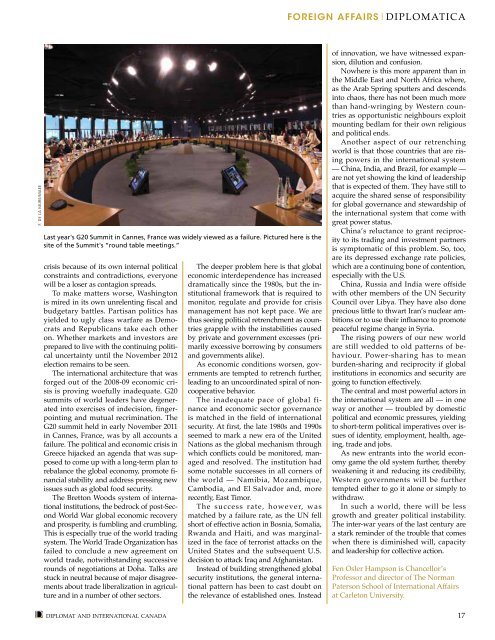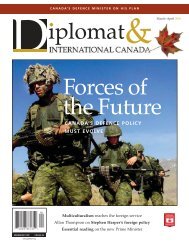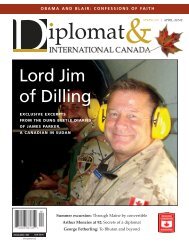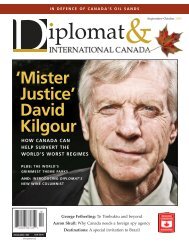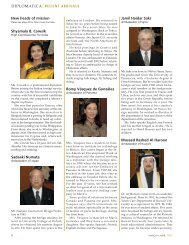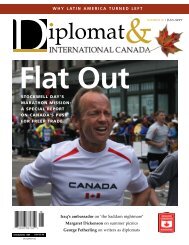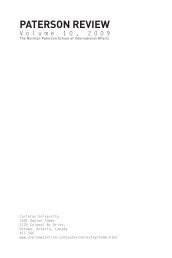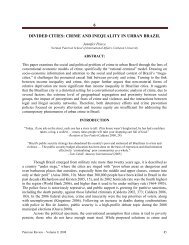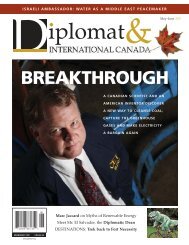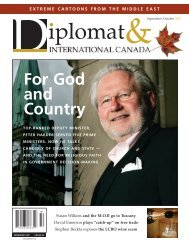John Baird: Canada's freedom agenda - Diplomat Magazine
John Baird: Canada's freedom agenda - Diplomat Magazine
John Baird: Canada's freedom agenda - Diplomat Magazine
Create successful ePaper yourself
Turn your PDF publications into a flip-book with our unique Google optimized e-Paper software.
Foreign Affairs|DIPLOMATICAF. de La Mure/MAEELast year's G20 Summit in Cannes, France was widely viewed as a failure. Pictured here is thesite of the Summit's “round table meetings.”crisis because of its own internal politicalconstraints and contradictions, everyonewill be a loser as contagion spreads.To make matters worse, Washingtonis mired in its own unrelenting fiscal andbudgetary battles. Partisan politics hasyielded to ugly class warfare as Democratsand Republicans take each otheron. Whether markets and investors areprepared to live with the continuing politicaluncertainty until the November 2012election remains to be seen.The international architecture that wasforged out of the 2008-09 economic crisisis proving woefully inadequate. G20summits of world leaders have degeneratedinto exercises of indecision, fingerpointingand mutual recrimination. TheG20 summit held in early November 2011in Cannes, France, was by all accounts afailure. The political and economic crisis inGreece hijacked an <strong>agenda</strong> that was supposedto come up with a long-term plan torebalance the global economy, promote financialstability and address pressing newissues such as global food security.The Bretton Woods system of internationalinstitutions, the bedrock of post-SecondWorld War global economic recoveryand prosperity, is fumbling and crumbling.This is especially true of the world tradingsystem. The World Trade Organization hasfailed to conclude a new agreement onworld trade, notwithstanding successiverounds of negotiations at Doha. Talks arestuck in neutral because of major disagreementsabout trade liberalization in agricultureand in a number of other sectors.The deeper problem here is that globaleconomic interdependence has increaseddramatically since the 1980s, but the institutionalframework that is required tomonitor, regulate and provide for crisismanagement has not kept pace. We arethus seeing political retrenchment as countriesgrapple with the instabilities causedby private and government excesses (primarilyexcessive borrowing by consumersand governments alike).As economic conditions worsen, governmentsare tempted to retrench further,leading to an uncoordinated spiral of noncooperativebehavior.The inadequate pace of global financeand economic sector governanceis matched in the field of internationalsecurity. At first, the late 1980s and 1990sseemed to mark a new era of the UnitedNations as the global mechanism throughwhich conflicts could be monitored, managedand resolved. The institution hadsome notable successes in all corners ofthe world — Namibia, Mozambique,Cambodia, and El Salvador and, morerecently, East Timor.The success rate, however, wasmatched by a failure rate, as the UN fellshort of effective action in Bosnia, Somalia,Rwanda and Haiti, and was marginalizedin the face of terrorist attacks on theUnited States and the subsequent U.S.decision to attack Iraq and Afghanistan.Instead of building strengthened globalsecurity institutions, the general internationalpattern has been to cast doubt onthe relevance of established ones. Insteadof innovation, we have witnessed expansion,dilution and confusion.Nowhere is this more apparent than inthe Middle East and North Africa where,as the Arab Spring sputters and descendsinto chaos, there has not been much morethan hand-wringing by Western countriesas opportunistic neighbours exploitmounting bedlam for their own religiousand political ends.Another aspect of our retrenchingworld is that those countries that are risingpowers in the international system— China, India, and Brazil, for example —are not yet showing the kind of leadershipthat is expected of them. They have still toacquire the shared sense of responsibilityfor global governance and stewardship ofthe international system that come withgreat power status.China’s reluctance to grant reciprocityto its trading and investment partnersis symptomatic of this problem. So, too,are its depressed exchange rate policies,which are a continuing bone of contention,especially with the U.S.China, Russia and India were offsidewith other members of the UN SecurityCouncil over Libya. They have also doneprecious little to thwart Iran’s nuclear ambitionsor to use their influence to promotepeaceful regime change in Syria.The rising powers of our new worldare still wedded to old patterns of behaviour.Power-sharing has to meanburden-sharing and reciprocity if globalinstitutions in economics and security aregoing to function effectively.The central and most powerful actors inthe international system are all — in oneway or another — troubled by domesticpolitical and economic pressures, yieldingto short-term political imperatives over issuesof identity, employment, health, ageing,trade and jobs.As new entrants into the world economygame the old system further, therebyweakening it and reducing its credibility,Western governments will be furthertempted either to go it alone or simply towithdraw.In such a world, there will be lessgrowth and greater political instability.The inter-war years of the last century area stark reminder of the trouble that comeswhen there is diminished will, capacityand leadership for collective action.Fen Osler Hampson is Chancellor’sProfessor and director of The NormanPaterson School of International Affairsat Carleton University.diplomat and international canada 17


